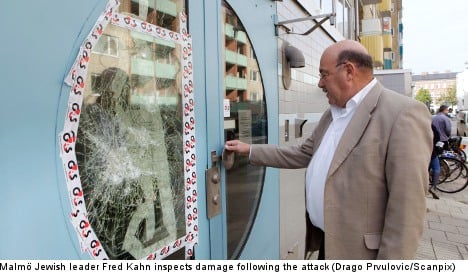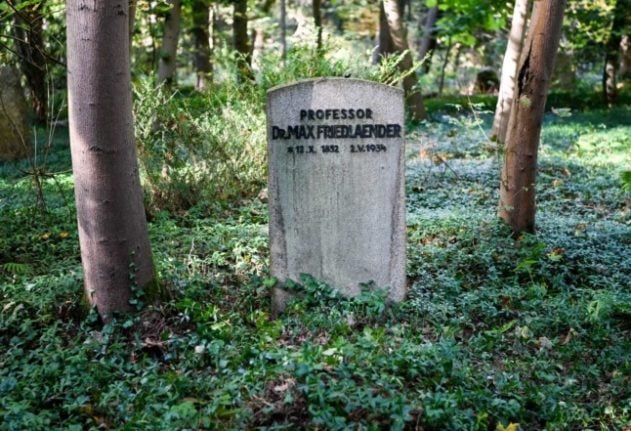The blast, which occurred between 12.30am and 12.45am on Friday, damaged the door and entryway to the building, but no one was injured.
“Some sort of firecracker was used and rocks were thrown at the building,” Skåne County police spokesperson Cindy Schönström-Larsson told the TT news agency.
The suspects were arrested before dawn on Friday after being spotted in a vehicle that witnesses had seen near the scene of the blast.
The teens deny having committed any crime, but remain in custody on suspicion of aggravated destruction of property.
The city’s Jewish leaders expressed their shock and fear following the attack.
Fred Kahn, head of the Jewish community in Malmö, said the attack reaffirms the view that the Jews in Malmö remain under threat and have suffered as a result.
“We need to heighten our security, but we don’t have the money for things like that,” he told the TT news agency.
Lena Posner-Körösi, chair of the Official Council of Swedish Jewish Communities (Judiska centralrådet) explained that the Skåne County governing board has twice rejected applications by the Malmö Jewish community to install surveillance cameras on the street adjacent to the building that was attacked on Friday morning.
“We’ve been rejected because they think it’s a quiet street, which is just horrible,” she told TT.
Posner-Körösi said there was no doubt in her mind that the attack was motivated by anti-Semitism.
“It’s obvious when you consider everything that’s happened in Malmö in recent years. It’s unthinkable that it could be something else,” she said.
Since 1990, however, the Jewish community has had permission to have cameras installed in the building’s entryway. However, a police spokesperson refused to say whether Friday’s attack had been captured on film.
Malmö’s Social Democratic mayor Ilmar Reepalu, who has come under fire on numerous occasions for remarks interpreted as being anti-Semitic, condemned Friday’s attack as “a criminal act”.
However, opposition city council member Anja Sonesson of the Moderate Party blamed Reepalu and the rest of the city’s political leadership from the Left, Green, and Social Democrat parties for contributing to the heightened tensions.
“They have a responsibility because for many years they haven’t distanced themselves enough and haven’t chosen to actively reduce the tensions,” she told TT.
“In their internal documents they don’t want to highlight ant-Semitism as a problem in this city.”
She added that what she referred to as “Reepalu’s statements and fallacies” have given Malmö a bad reputation abroad as a city rife with anti-Semitism.
Sonesson also pointed out that the city’s leadership is continually getting involved in issues related to the actions of the state of Israel.
As an example, she pointed to the agenda for an upcoming council meeting which includes discussion of a security company that is active on the West Bank.
“They do this while at the same time refusing to look into the actions of any other country,” she said.
Social Democrat party leader Stefan Löfven, who also condemned the attack, called Sonesson’s criticism “irresponsible” and said now was not the time to point fingers.
Despite the political posturing, Jewish community leader Kahn pointed out that one of the first calls he received Friday morning was from Reepalu.
“The support we’ve received has been incredibly important. It’s overwhelming for many of us,” he told the local Skånska Dagbladet newspaper.
However, Kahn remained at a loss as to why Jews in Malmö appear to be subject to more threats and violence than Jews elsewhere in the country.
“More attacks are directed at Jews in Malmö. I haven’t heard about it happening in other places in Sweden,” he told the paper.
“But maybe there are only a few people who do things like this. A single individual can still cause a lot of harm.”
TT/The Local/dl



 Please whitelist us to continue reading.
Please whitelist us to continue reading.
Member comments